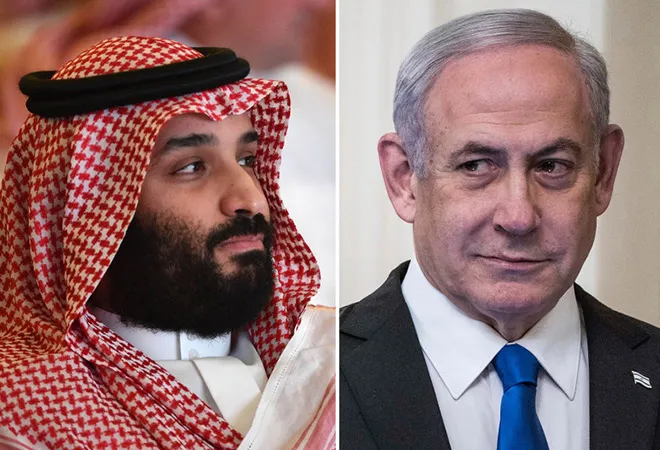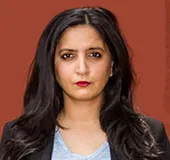
At 7:30 pm on November 22, a flight took off from Tel Aviv and dropped off the radar near Neom, a futuristic Saudi city on the shores of the red sea.
While the flying cars Neom promises may be sometime in the distant future, an equally unimaginable but political event seemed to have occurred.
Onboard the historic flight was Israeli Prime Minister Benjamin Netanyahu,
according to Israeli paper Haaretz. He flew to meet Mohamad Bin Salman (MBS), the Crown Prince of a country that is home to two of the holiest sites in Islam and is seen by many as the leader of the Sunni Muslims in the world.
Since the formation of the state of Israel in 1948, Arabs, often led by Saudi Arabia, have refused to acknowledge the new state. Diplomatic ties and normalisation with Israel had always been linked to Palestinians having their own state, according to the Saudis’ Arab Peace Initiative of 2002.
But lately, encouraged by Donald Trump, winds of peace have been blowing between Israel and the Saudi-led bloc of Arab nations, only if to contain common enemy Iran.
Encouraged by Donald Trump, winds of peace have been blowing between Israel and the Saudi-led bloc of Arab nations, only if to contain common enemy Iran.
Saudi Arabia wanted to keep it hush-hush and so Prince Faisal bin Farhan Al Saud, Saudi Foreign Minister, was quick to
tweet a denial of Netanyahu’s visit. On Sunday, he said: “I have seen press reports about a purported meeting between HRH the Crown Prince and Israeli officials during the recent visit by @SecPompeo. No such meeting occurred. The only officials present were American and Saudi.”
Israeli media and political circles, however, were abuzz with the talk of the visit and few tried to disprove the reports. Yoav Galant, the Israeli education minister, analysed the meaning of the visit on a radio station. “An axis is emerging that includes Israel, the United States, and anyone who shares against Iranian Shiite extremism. The very act of holding the meeting and making it public - even if it is semi-formal - is very important.”
Since the Islamic revolution in 1979 Iranian clerics have made a mortal enemy out of Israel partly to appear as better Muslims, and hence better leaders of the Muslim world than Saudi Arabia. It has intermittently questioned Riyadh’s custodianship of the holy mosques, a threat that directly challenges the rule of the Sauds. Such policies, combined with Iran’s recent regional expansion from Tehran to Lebanon through Syria and Iraq, has antagonised both the Saudis and the Israelis.
Instead of simply managing Iran, the young and restless crown prince decided to confront the threat and opted for a two-pronged approach.
First, slow and secret rapprochement with Israel and the formation of a regional and global alliance against Iran. Over the last few months, MBS tacitly backed peace deals between Israel and three Arab countries: The United Arab Emirates, Bahrain, and Sudan.
Secondly, promoting a more accommodative face of Islam to change its image in the world. Saudi Arabia has long been seen as a supporter of the Wahhabi ideology which many of the terrorist networks, responsible for many terrible terror attacks, espoused to. While the Saudi government has not directly been linked to any such acts, indirect Saudi funding has reportedly often ended up with extremist elements.
In an
interview with The Guardian MBS blamed Iran for Saudi Arabia’s adoption of hard-line Sunni Wahhabism. Saudi royals, he said, “didn’t know how to handle” Iran’s emergence as the ideal of Islamists all over the region.
The recent visit was also to come up with a strategy to deal with America’s president-elect Joe Biden who has been critical of Saudi Arabia and more considerate of Palestinian aspirations. MBS and Netanyahu worry that Biden may seek to revive the Iran nuclear deal signed during Barack Obama’s presidency, but scrapped by Trump. A new deal would mean Iran would be able to sell its oil and make money which it could if it wanted, use to fund its proxies in the region and continue to expand and threaten Tel Aviv and Riyadh.
MBS and Netanyahu worry that Biden may seek to revive the Iran nuclear deal signed during Barack Obama’s presidency, but scrapped by Trump
Whichever way it swings, India is safe as it friends with everyone: both Saudi Arabia and Iran, as well as Israel and Palestine. But India’s position has shifted, even if slightly. It has more often been spotted in the Israel-Saudi-America orbit. That decision has so far been advantageous.
Last year when the Indian government stripped Kashmir of its special status, there was no criticism from the Saudi bloc.
The views expressed above belong to the author(s). ORF research and analyses now available on Telegram! Click here to access our curated content — blogs, longforms and interviews.



 At 7:30 pm on November 22, a flight took off from Tel Aviv and dropped off the radar near Neom, a futuristic Saudi city on the shores of the red sea.
While the flying cars Neom promises may be sometime in the distant future, an equally unimaginable but political event seemed to have occurred.
Onboard the historic flight was Israeli Prime Minister Benjamin Netanyahu,
At 7:30 pm on November 22, a flight took off from Tel Aviv and dropped off the radar near Neom, a futuristic Saudi city on the shores of the red sea.
While the flying cars Neom promises may be sometime in the distant future, an equally unimaginable but political event seemed to have occurred.
Onboard the historic flight was Israeli Prime Minister Benjamin Netanyahu,  PREV
PREV


